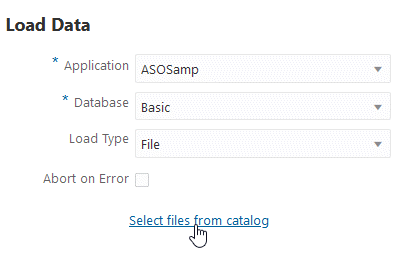Specify Files in a Catalog Path
If a data load or dimension build you are initiating for a cube requires a file or artifact that is located somewhere in Essbase other than the directory for the current cube, you can specify its catalog path.

Other operations involving files or artifacts require them to be located either in the cube directory, or a directory specified by an administrator.
When you leave the catalog path unspecified, the cube directory is the assumed location, unless an administrator has specified an alternate path (by using FILEGOVPATH configuration).
The cube directory means the <Application Directory>/app/appname/dbname folder.
If you do not know where <Application Directory> is in your environment,
-
Refer to Environment Locations in the Essbase Platform if you use an independent Essbase deployment.
-
If you use an Essbase deployment on Oracle Cloud Infrastructure Marketplace, then <Application Directory> is
/u01/data/essbase/app.
Whether you are using Jobs, MaxL, or Command Line Interface (CLI) for data loads or dimension builds, you can specify the catalog path to the needed files.
For example, the following MaxL import data statement performs a data load using a data file stored in the shared folder of the Essbase file catalog. The rule file is in the cube directory for Sample Basic.
import database 'Sample'.'Basic' data from server data_file 'catalog/shared/Data_Basic' using server rules_file 'Data' on error write to "dataload.err";In the following CLI dimbuild example, the rule file is specified in a user directory, and the data file in a shared directory.
esscs dimbuild -a Sample -db Basic -CRF /users/admin/Dim_Market.rul -CF /shared/Market.txt -R ALL_DATA -FNote:
If your Essbase deployment is on Oracle Cloud
Infrastructure Marketplace and uses object storage integration, then any jobs requiring access to files in shared or user directories in the Essbase catalog will search for them in (or export them to) the OCI object storage bucket associated with the Essbase stack on OCI. For more information, see Create Stack.